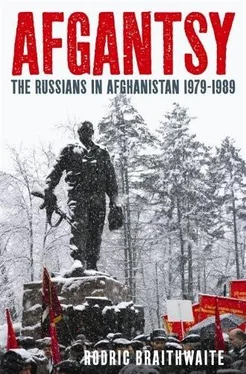All this had an increasingly negative effect on the formulation and execution of policy, including the decision to invade Afghanistan in the first place, and the management of policy in the nine years after the invasion took place. Afghan government leaders naturally took advantage of these differences to play one faction off against the other.
Artem Borovik, who was one of the first journalists to tell the Soviet public what was actually going on, concluded, ‘One of our problems in Afghanistan, it seemed to me, was that the Soviet Union never had a central office in charge of the various delegations of its super-ministries: the KGB, MID [Ministry of Foreign Affairs], MVD [Ministry of Internal Affairs], and Ministry of Defence. The chiefs of these groups acted autonomously, often sending contradictory information to Moscow and often receiving conflicting orders in return. The four offices should have been consolidated under the leadership of the Soviet ambassador. But there were so many different Soviet ambassadors that none of them had enough time to become thoroughly familiar with the state of affairs in Kabul. There was Tabeev, then Mozhayev, then Yegorychev, then Vorontsov—all within a two-year period. Of these four men, only Vorontsov was a professional diplomat with extensive experience in Central Asia. While the rest had enjoyed successful careers within the Party apparatus, they had no background in Central Asia affairs.’ 4
Such dysfunction was not unique to the Soviet effort in Afghanistan. Fifteen years earlier the US mission in Saigon in 1966 had been in equal disarray, the consequence of a rapid build-up, pressure from above, frequent changes of staff, personal frustration, poor leadership, and fatigue. The Americans had landed themselves with an open-ended commitment which, as one American official said at the time, could ‘lure us unwillingly and unwittingly into a strange sort of “revolutionary colonialism”—our ends are “revolutionary”, our means quasi-colonial’. 5Much the same could have been said of the US-led coalition in Kabul forty years later.
The crisis now exploded. Taraki was due to fly to Havana for a meeting of the Heads of the Non-Aligned Movement. The KGB warned him not to leave Kabul at this time, since Amin might move in his absence. He ignored them and departed on 1 September. His delegation was almost wholly composed of men with confidential links to Amin, notably Major Tarun, Taraki’s personal adjutant, who played an equivocal—and for himself fatal—role in the events of the next two weeks.
In Taraki’s absence relations between Amin and the Gang of Four deteriorated still further. The four men stopped sleeping at home to avoid arrest, and began to circulate leaflets calling for opposition to Amin and the restoration of unity between the party’s two warring factions. Sarwari telephoned Taraki in Havana to warn him that Amin was preparing to take power.
On his way back from Havana Taraki stopped in Moscow on 10 September to meet Brezhnev and Gromyko. Brezhnev spoke in grave terms about the situation in the Afghan leadership, ‘which is causing particular concern not only to your Soviet comrades, but also, according to information we have, to the members of the PDPA… [T]he concentration of excessive power in the hands of others, even your closest aides, could be dangerous for the fate of the revolution. It can hardly be expedient for one person to occupy an exclusive position in the leadership of the country, the armed forces, and the organs of state security.’ Brezhnev clearly had Amin in mind; but if it was a hint that Moscow would support the removal of Amin, Taraki did not pick it up. 6Instead he asked once again for direct military support, and once again the request was rejected. He also met Babrak Karmal, who had been brought by the KGB to Moscow. The two men discussed ways of restoring party unity and getting rid of Amin. News of this meeting apparently leaked to Amin, perhaps through Major Tarun.
That evening, at his lodging on the Lenin Hills overlooking Moscow, Taraki met Alexander Petrov, a KGB officer who had previously worked in Afghanistan. Petrov warned him that Amin was plotting against him. Taraki replied, ‘Don’t worry. Tell the Soviet leadership that for the time being I am in complete control of the situation, and that nothing happens without my knowing about it.’ 7He repeated this optimistic assurance to Brezhnev as he left Moscow for the onward flight to Kabul.
The Russians were by no means so sure. That same night, Colonel Kolesnik (a code name adopted for the purpose of this operation: his real name was Kozlov), the GRU staff officer who was later to plan and direct the storming of Amin’s palace in Kabul, briefed Major Khalbaev, the commander of the Muslim Battalion, to join his men in Tashkent and prepare them to fly to Kabul to protect Taraki. He showed Khalbaev a picture of Taraki and said, ‘The order to protect that man comes straight from Brezhnev himself. If he dies, then you and your battalion had better not come back alive.’ The men of the Muslim Battalion were ordered to hand in all their documents and don Afghan uniform, ready to move at a moment’s notice. But Andropov was already considering various covert ways of removing Amin, including kidnapping him and taking him to the Soviet Union. He persuaded Brezhnev and Taraki that the Muslim Battalion should stay where it was, at least for the time being.
On 11 September Taraki flew back to Kabul. Amin had already begun to take his own measures. Taraki’s aircraft was made to circle over Kabul for a whole hour while Colonel Yakub, the Chief of the General Staff, completely revised the security arrangements to ensure that they were under the control of Amin’s men. 8As soon as he had landed, Taraki demanded that Amin tell him what had happened to the four ministers, the Gang of Four. ‘Don’t worry, they’re all safe and well,’ replied Amin. The two men then drove together to the Central Committee in town, where Taraki reported on his trip to Havana.
The next morning the row over the four ministers continued. Amin claimed that the four men had been behind an attempt to assassinate him while Taraki was away. They should be sacked and punished. Taraki asked Amin to accept their apologies, then reinstate them. Amin retorted that if the ministers did not go he would refuse to follow any of Taraki’s further instructions.
Meanwhile the four ousted ministers were operating out of the presidential palace, Abdur Rahman’s Arg, which the Communists had renamed the House of the People. Watanjar rang round all the commanders of the Kabul garrison to find out which of them was loyal to Taraki. They immediately reported these approaches to Colonel Yakub, who told Amin. Gulabzoi suggested to Taraki that he ask for the Soviet battalion stationed in Bagram to be sent to Kabul to guard him. Taraki told him that was unnecessary. The quarrel had been settled. In any case it was inappropriate for him to hide behind Soviet bayonets. 9Gulabzoi told him that there had been a shoot-out that morning at the Ministry of Security when Amin’s men had come to arrest Sarwari. Two people had been killed. Gulabzoi again asked Taraki to act. Again Taraki calmed him down, saying all was going according to plan. Tarun faithfully reported these goings-on to Amin.
By now the Russians were getting far more deeply involved, though this brought them no greater influence on events. On the evening of 13 September the four ousted ministers came to the Soviet Embassy. In the name of Taraki they asked for Soviet help to arrest Amin. Less than two hours later, Tarun rang from the palace to say that Amin had arrived there. He and Taraki were both asking the Russians to join them.
The Russians judged that the situation had become critical. ‘The possibility that H [Hafizullah] Amin might order the military units loyal to him to take up arms against Taraki,’ they later telegraphed to Moscow, ‘could not be excluded. Both groups were trying to enlist our support. For our part we were sticking firmly to the line that the situation in the leadership must be normalised along party lines, i.e. collectively. At the same time we were trying to restrain both groups from acting in haste and without thinking.’ 10
Читать дальше












